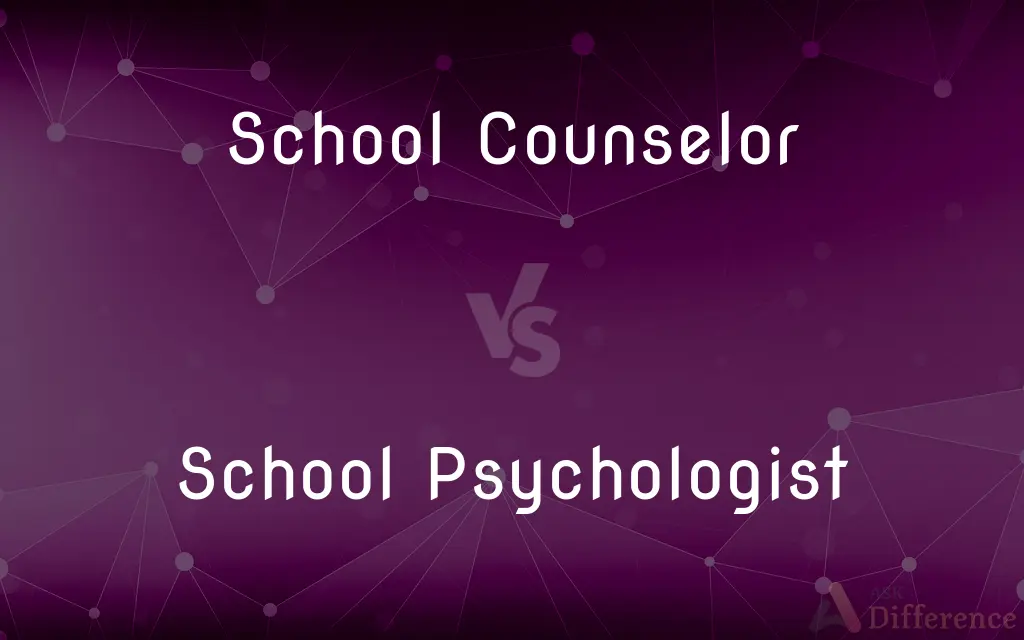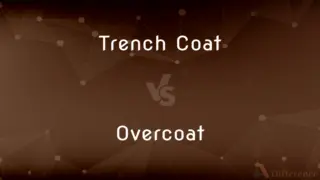School Counselor vs. School Psychologist — What's the Difference?
By Tayyaba Rehman — Published on November 2, 2023
A school counselor provides academic, career, and personal guidance to students, while a school psychologist evaluates and supports students' psychological and educational needs.

Difference Between School Counselor and School Psychologist
Table of Contents
ADVERTISEMENT
Key Differences
A school counselor primarily focuses on helping students navigate their academic and career paths. They might advise on course selections, college applications, or career explorations. Conversely, a school psychologist delves deeper into understanding the psychological and educational challenges a student may face, employing techniques grounded in psychological research.
While the school counselor tends to work closely with teachers and parents to optimize a student's school experience, a school psychologist might perform assessments to diagnose learning or behavioral disorders.
Both roles are integral to the education system; the school counselor typically addresses broader student needs, whereas the school psychologist focuses on specialized psychological interventions.
Comparison Chart
Primary Focus
Academic, career, and personal guidance
Psychological and educational evaluation and intervention
Training
Master's in school counseling
Usually a graduate degree in school psychology
ADVERTISEMENT
Typical Tasks
Advising on courses, colleges, personal issues
Diagnosing learning/behavioral disorders, developing intervention plans
Interaction
Regular meetings with students, teachers, parents
Specialized consultations, testing sessions
Goal
Help students navigate school life
Understand and address specific psychological and educational challenges
Compare with Definitions
School Counselor
School Counselor refers to someone guiding students on career choices.
He met the school counselor to discuss potential careers in science.
School Psychologist
School Psychologist implies an expert trained in psychological testing.
He was referred to the school psychologist for an IQ test.
School Counselor
School Counselor is an advocate for students within the education system.
The school counselor intervened when he was being bullied.
School Psychologist
School Psychologist denotes a liaison between the school system and broader psychological services.
The school psychologist coordinated with outside therapists for continued care.
School Counselor
School Counselor implies an expert addressing students' personal and social issues.
She confided in the school counselor about her struggles at home.
School Psychologist
School Psychologist means a professional assessing students' psychological needs.
The school psychologist identified her learning difficulty.
School Counselor
School Counselor means a professional aiding students' academic and personal development.
The school counselor helped her choose the right college.
School Psychologist
School Psychologist refers to someone providing therapeutic interventions for students.
After the traumatic event, students were encouraged to see the school psychologist.
School Counselor
School Counselor denotes a mediator between students, parents, and teachers.
Parents met the school counselor to discuss their son's progress.
School Psychologist
School Psychologist is an advocate for students' psychological well-being.
The school psychologist implemented a school-wide mental health program.
Common Curiosities
What degree does a school counselor typically hold?
A school counselor usually has a master's degree in school counseling.
What's the primary role of a school psychologist?
To assess, diagnose, and provide interventions for psychological and educational challenges faced by students.
Can a school counselor provide therapy?
While they can provide guidance and short-term support, they're not typically trained to offer long-term therapy like licensed therapists.
Can both work with parents and teachers?
Yes, both school counselors and school psychologists collaborate with parents and teachers.
Is confidentiality maintained with both roles?
Yes, both maintain confidentiality, but there are exceptions, especially concerning students' safety.
Can school psychologists counsel students?
Yes, they can provide short-term counseling and refer for longer-term therapy.
Who helps students with personal problems?
Both can assist, but school counselors often handle general personal and social issues, while school psychologists tackle deeper psychological challenges.
Do school psychologists diagnose learning disorders?
Yes, school psychologists are trained to diagnose various learning and behavioral disorders.
Who helps with college applications?
School counselors often assist students with college applications and advice.
In which setting would you typically find a school psychologist?
Primarily in schools, but they might also work in district offices or educational agencies.
Who can provide career guidance?
While both can offer insights, school counselors typically specialize in career guidance.
Are school psychologists licensed?
Yes, they typically hold licensure to practice in their state.
Do both roles require continuous education?
Yes, to stay updated and maintain licensure, both professions often require ongoing education.
Who might create an Individualized Education Plan (IEP)?
Both can be involved, but school psychologists often play a key role in assessments and recommendations.
Share Your Discovery

Previous Comparison
Levigation vs. Trituration
Next Comparison
Trench Coat vs. OvercoatAuthor Spotlight
Written by
Tayyaba RehmanTayyaba Rehman is a distinguished writer, currently serving as a primary contributor to askdifference.com. As a researcher in semantics and etymology, Tayyaba's passion for the complexity of languages and their distinctions has found a perfect home on the platform. Tayyaba delves into the intricacies of language, distinguishing between commonly confused words and phrases, thereby providing clarity for readers worldwide.













































